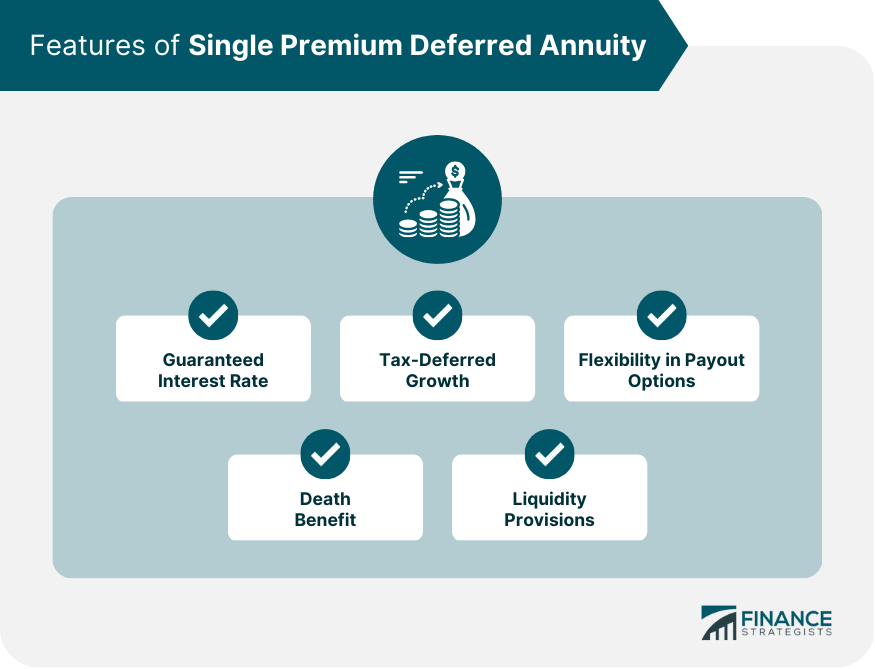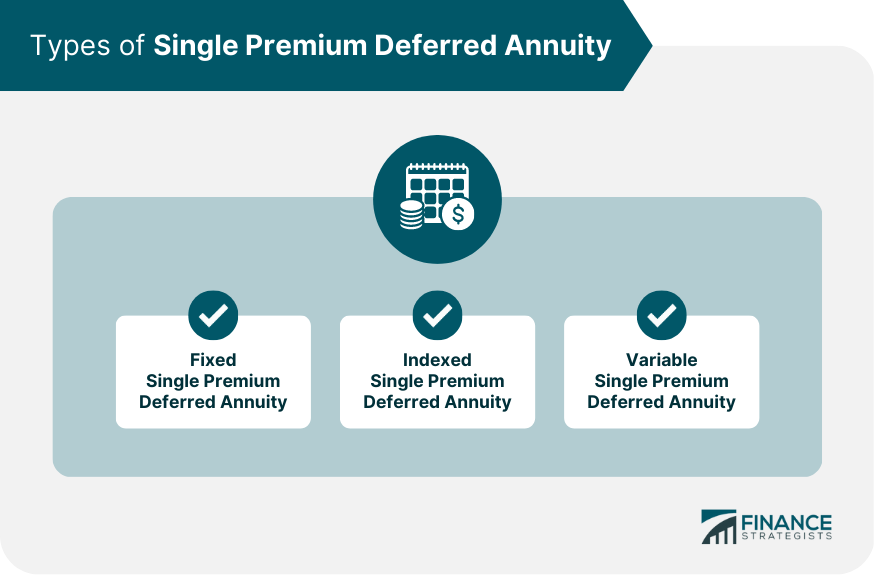A Single Premium Deferred Annuity (SPDA) is a type of annuity that allows an individual to invest a lump-sum payment with an insurance company to grow tax-deferred over time. SPDAs are also attractive to those seeking tax-deferred growth and protection of their assets from market volatility. Financial advisors and insurance agents may also recommend these products to their clients. Individuals who purchase a single premium deferred annuity transfer a lump-sum payment to an insurance company. The insurance company then invests the funds in various assets, such as bonds, stocks, or real estate. During the accumulation phase, the investment grows tax-deferred, meaning that the individual only pays taxes on gains once they receive payouts. The individual can choose when to begin receiving payouts, which can be immediate or deferred. If they choose a deferred payout, they continue to earn interest on their investment until the start of the payout phase. The payout can be a fixed amount or vary based on the performance of the underlying investments. Single premium deferred annuities offer several features that make them attractive to individuals seeking steady income during retirement. Guaranteed Interest Rate: SPDAs offer a guaranteed interest rate, which means that the investment grows at a fixed rate, regardless of market fluctuations. This can provide a sense of security to individuals who do not want to take on investment risk. Tax-Deferred Growth: Single premium deferred annuities allow the investment to grow tax-deferred, meaning that the individual does not pay taxes on any gains until they receive payouts. This can allow the investment to compound more quickly. Flexibility in Payout Options: Single Premium Deferred Annuities offer flexibility in choosing the payout options, which can be tailored to the individual's specific needs. Death Benefit: SPDAs may also offer a death benefit, which guarantees that the individual's heirs will receive a certain minimum amount if they pass away before the payout phase begins. Liquidity Provisions: SPDAs may offer liquidity provisions allowing the individual to withdraw funds without penalty. This can provide some flexibility in case of unforeseen financial needs. Individuals can choose from several types of Single Premium Deferred Annuities, depending on their risk tolerance and investment goals. Fixed Single Premium Deferred Annuity: This type of annuity guarantees a fixed interest rate for the entire accumulation phase. This can provide a sense of security to individuals who do not want to take on investment risk. Indexed Single Premium Deferred Annuity: This annuity ties investment growth to the performance of an index, such as the S&P 500. This can provide the potential for higher returns but also comes with more risk. Variable Single Premium Deferred Annuity: A variable single premium deferred annuity allows the individual to choose from various investment options, such as mutual funds or stocks. SPDAs offer several benefits to individuals seeking steady income during retirement. The guaranteed interest rate ensures that the investment grows at a fixed rate, regardless of market fluctuations. This can particularly attract individuals who do not want to take on investment risk. SPDAs offer tax-deferred growth, which allows the investment to compound more quickly. The individual has flexibility in choosing the payout options, which can be tailored to their specific needs. Despite these advantages, SPDAs also have some disadvantages. The insurance company may charge fees and commissions, reducing the overall return on investment. The surrender period, during which the individual cannot withdraw funds without incurring a penalty, can also limit liquidity. Single Premium Deferred Annuities can be compared to other annuity products offering similar benefits. A single premium immediate annuity provides immediate payouts to the individual in exchange for a lump-sum payment. This can be attractive to individuals who want to begin receiving income immediately. On the other hand, a flexible premium annuity allows the individual to make ongoing payments into the annuity in addition to a lump-sum payment. This provides more flexibility in funding the annuity but also comes with higher fees and charges. Before purchasing a Single Premium Deferred Annuity, there are several considerations that an individual should take into account. Fees and Charges: The insurance company may charge fees and commissions, which can reduce the overall return on investment. Understanding the fee structure and comparing it with other investment options is essential. Surrender Period: The surrender period, during which the individual cannot withdraw funds without incurring a penalty, can limit liquidity. Understanding the length of the surrender period and the penalty for early withdrawal is important. Insurance Company Ratings: The financial strength and stability of the insurance company are important to consider when purchasing a Single Premium Deferred Annuity. Tax Implications: Single Premium Deferred Annuities offer tax-deferred growth, but the individual will eventually pay taxes on the investment gains when they receive payouts. Single premium deferred annuities offer a way for individuals to protect their financial future, secure a steady income stream, and preserve their assets from market volatility. They offer several features and benefits, including guaranteed interest rates, tax-deferred growth, flexibility in payout options, and death benefits. However, they also come with disadvantages, including fees, charges, and surrender periods. Individuals considering purchasing a single premium deferred annuity should consider several considerations, including fees and charges, surrender periods, insurance company ratings, and tax implications. They should also compare SPDAs with other annuity products to determine which fits their investment goals and risk tolerance best. Individuals can make informed decisions by taking the time to understand the features, benefits, and considerations of SPDAs. It is important to seek advice before obtaining a single premium deferred annuity. An insurance broker can help individuals assess their financial situation and goals, evaluate different insurance options, and recommend a plan that fits their unique needs.Definition of Single Premium Deferred Annuity
The annuity contract specifies the length of the accumulation phase, during which the individual does not receive any payouts. The individual can choose when to begin receiving payouts, which can be a fixed period or a lifetime.
Single premium deferred annuities are designed for individuals with a lump-sum payment willing to defer receiving payouts until later. This includes individuals nearing retirement or receiving a windfall, inheritance, or settlement.
Have questions about annuities? Click here.How Single Premium Deferred Annuity Works
Features of Single Premium Deferred Annuity
Payouts can be immediate or deferred, fixed or variable, and for a fixed period or the individual's lifetime.
Types of Single Premium Deferred Annuity
This provides more flexibility but also comes with higher investment risk.
Pros & Cons of Single Premium Deferred Annuity
Comparison With Other Annuity Products
Considerations for Purchasing a Single Premium Deferred Annuity
Researching the insurance company's ratings from independent rating agencies is important.
Understanding the tax implications and consulting with a tax professional are important.Conclusion
Single Premium Deferred Annuity FAQs
A single premium deferred annuity is a type of annuity that allows an individual to invest a lump-sum payment with an insurance company to grow tax-deferred over time.
Individuals with a lump-sum payment are willing to defer receiving payouts until later, such as those nearing retirement or those who have received a windfall, inheritance, or settlement. Financial advisors and insurance agents may also recommend these products to their clients.
Single premium deferred annuities offer several advantages, including a guaranteed interest rate, tax-deferred growth, flexibility in payout options, and a death benefit.
Single premium deferred annuities also have drawbacks, such as fees, charges, and surrender periods, which limit liquidity.
Before purchasing a single premium deferred annuity, individuals should consider factors such as fees and charges, surrender periods, insurance company ratings, and tax implications. They should also compare single premium Deferred Annuities with other annuity products to determine which best fits their investment goals and risk tolerance. Seeking professional financial advice from a financial advisor is also recommended.
True Tamplin is a published author, public speaker, CEO of UpDigital, and founder of Finance Strategists.
True is a Certified Educator in Personal Finance (CEPF®), author of The Handy Financial Ratios Guide, a member of the Society for Advancing Business Editing and Writing, contributes to his financial education site, Finance Strategists, and has spoken to various financial communities such as the CFA Institute, as well as university students like his Alma mater, Biola University, where he received a bachelor of science in business and data analytics.
To learn more about True, visit his personal website or view his author profiles on Amazon, Nasdaq and Forbes.















